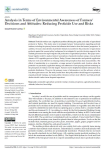Gurbuz I.B. (2024). Analysis in terms of environmental awareness of farmers' decisions and attitudes: reducing pesticide use and risks. Sustainability, 01/06/2024, vol. 16, n. 11, p. 4323.
https://doi.org/10.3390/su16114323
https://doi.org/10.3390/su16114323
| Titre : | Analysis in terms of environmental awareness of farmers' decisions and attitudes: reducing pesticide use and risks (2024) |
| Auteurs : | I.B. Gurbuz |
| Type de document : | Article |
| Dans : | Sustainability (vol. 16, n. 11, June 2024) |
| Article en page(s) : | p. 4323 |
| Langues : | Anglais |
| Langues du résumé : | Anglais |
| Catégories : |
Catégories principales 06 - AGRICULTURE. FORÊTS. PÊCHES ; 6.6 - Technique Agricole (sols, engrais, mécanisation)Thésaurus IAMM PESTICIDE ; RESIDU DE PESTICIDE ; AGRICULTEUR ; COMPORTEMENT DES AGRICULTEURS ; POLLUTION PAR L'AGRICULTURE ; TURQUIE |
| Résumé : | Pesticide residues are a significant problem affecting the quality and safety of agricultural products in Turkey. This study aims to investigate farmers' risk perception regarding pesticide residues, including the primary factors that influence their behavior from the farmers' perspective. In addition, the main characteristics of pesticide residues encountered in the production of agricultural products against the current policy background is investigated to provide decision support to the Turkish government for improving the safe production of agricultural products. This paper uses a binary logistic model to analyze farmers' perceptions of pesticide residues using a cross-sectional dataset of 323 vegetable growers in Bursa, Turkey. Farmer characteristics and pesticide application behavior were more effective in reducing residual risk perceptions than farm characteristics. The effects of membership in a cooperative, average amount of pesticide used, location where the pesticide was purchased, application timing, and adherence to last spraying and harvest timing on the perception of residues were the largest. Farmers receive helpful but limited information from pesticide distributors. However, the primary source of information is not the advisors, which is why these grievances exist. The study results show that policymakers should support cooperatives, expand pesticide training, and make public extension services more effective and that pesticide dealers should conduct more frequent inspections. |
| Cote : | En ligne |
| URL / DOI : | https://doi.org/10.3390/su16114323 |







